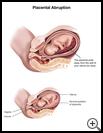
Placental Abruption
________________________________________________________________________
KEY POINTS
- Placental abruption means that the placenta pulls away from the wall of your uterus too early. Normally the placenta separates from the uterus and is delivered right after the birth of the baby.
- Sometimes the placenta starts to pull away from the uterus and then stops without treatment. As long as you and the baby are healthy, your pregnancy can continue with frequent checkups by your healthcare provider.
- More severe separation may require complete bed rest, and you may need to be in the hospital.
- In some cases your baby may need to be delivered right away.
________________________________________________________________________
What is placental abruption?
Placental abruption means that the placenta pulls away from the wall of your uterus too early. The placenta is tissue attached to the inside of the uterus and also attached to the baby by the umbilical cord. It carries oxygen and food from your blood to the baby’s blood.
This is a rare condition. Normally the placenta separates from the uterus and is delivered right after the birth of the baby.
What is the cause?
You are at higher risk for placental abruption if you:
- Are over 35 years old
- Have had more than 4 or 5 children
- Are pregnant with twins or triplets
- Have high blood pressure
- Use illegal drugs
- Have diabetes
- Have had a previous abruption
- Have to have your baby turned into the correct position for delivery
What are the symptoms?
Symptoms may include:
- Sudden pain in your belly over the uterus
- Bleeding from the vagina during the second half of pregnancy
How is it diagnosed?
Your healthcare provider will ask about your symptoms and medical history and examine you. Tests may include:
- Blood tests
- An ultrasound, which uses sound waves to show pictures of your uterus, the baby, and the tissue and fluid that surround your baby
- A nonstress test, which uses a monitor strapped your belly to record how your baby's heart rate changes when your baby moves
How is it treated?
Sometimes the placenta starts to pull away from the uterus and then stops without treatment. As long as you and the baby are healthy, your pregnancy can continue with frequent checkups by your healthcare provider. Your healthcare provider may recommend limiting your activities, including not having sex. Resting in bed for a few days may stop the bleeding.
More severe separation may require complete bed rest, and you may need to be in the hospital.
In some cases your baby may need to be delivered right away. Your healthcare provider may induce labor and deliver the baby vaginally. If the baby’s heart rate is abnormal, or if you are losing a lot of blood, you may have a C-section (an operation that delivers your baby through a cut in your belly and uterus).
A moderate to severe separation may have severe effects on you and your baby, such as:
- You may lose a lot of blood and need blood transfusions and intensive care after delivery. You may have problems with bleeding or blood clots for a few days.
- Your uterus may not contract (get smaller) after delivery. You may need medicine to help the uterus contract.
- You could go into shock. A severe case of shock may affect other organs of your body, such as your liver or kidneys.
- If your baby is born early, he or she may need to be in the newborn intensive care unit. A premature baby might have problems with breathing and feeding.
- If the separation is severe enough, your baby could have brain damage, or die before or shortly after birth.
How can I take care of myself?
- Follow your healthcare provider's instructions. Ask your provider:
- How and when you will get your test results
- How long it will take to recover
- If there are activities you should avoid and when you can return to your normal activities
- How to take care of yourself at home
- What symptoms or problems you should watch for and what to do if you have them
- Make sure you know when you should come back for a checkup.
How can I help prevent placental abruption?
Regular prenatal visits may help your healthcare provider detect problems ahead of time. If you have had a placental abruption and are pregnant again, be sure to tell your healthcare provider about it. Ask your provider about ways you can help lower the risk of problems during delivery.
If you smoke, drink alcohol, or use drugs, try to quit. Talk to your healthcare provider about ways to quit.
If you have diabetes or high blood pressure, follow your healthcare provider's instructions for treatment.
Keep all appointments for provider visits or tests.

